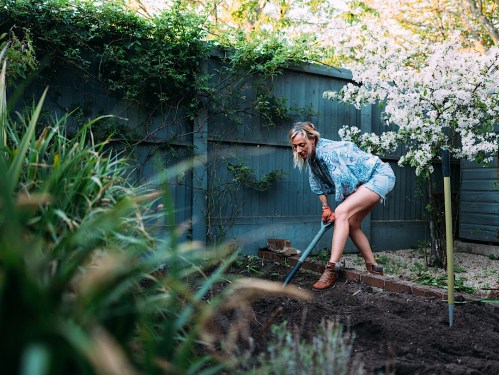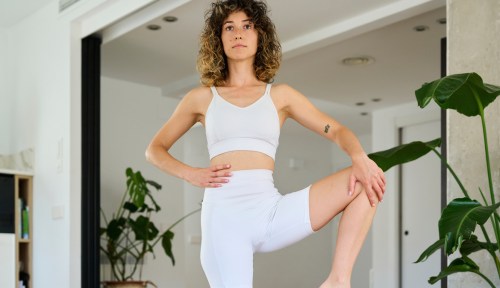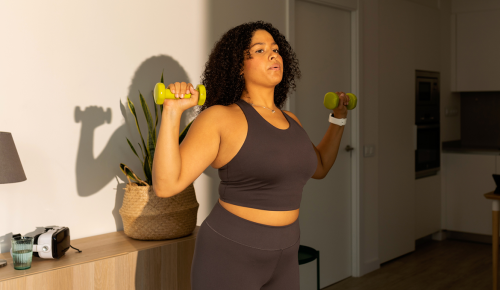Once upon a time, if you’d asked me what I considered to be a workout, I would’ve solely rattled off traditional gym sessions and classes from my favorite boutique fitness studios. Think high-intensity workouts like: Orangetheory, Barry’s, [solidcore], and Peloton (just to name a few). But that was before learning about the Blue Zones—and the world’s longest-living people who reside within them. Considering people in these longevity hotspots typically live 10 to 12 years longer than anyone anywhere else in the world, it’s worth looking into their lifestyle practices like their eating habits, as well as their Blue Zones exercise regimens.
Experts in This Article
board-certified family medicine physician
I decided to kickstart my Blue Zones exploration by homing in on the first of their nine lifestyle habits: to move naturally. After all, as endorphin-boosting as HIIT classes, sprints, and heavy lifting are, folks in the Blue Zones don’t rely on gyms, weightlifting, or fast runs. Instead, they move their bodies as our ancestors did—in the garden, at home, and on casual walks about town, with as few technological advancements as possible.
As someone who loves routine, I decided that I would adopt a Blue Zones exercise regimen, while also maintaining my regular fitness schedule. (Old habits die hard, okay?) Still, I found that my body and my mind responded positively to the inclusion of simpler, more grounded workouts.
Adopting a Blue Zones exercise regimen
For physical activity, folks in the Blue Zones plant gardens, tend to their landscapes, do manual labor, and walk a lot. As such—and considering I recently moved into my first home with its very own yard—rather than hiring a maintenance crew to tend to it, I decided to take that on myself.
And instead of letting my pup, Cash, play in the backyard in place of proper walks, I’d go on at least one (but preferably two) mile-long walks per day. Additionally, since I already had a trip on the schedule—and knowing that my dad and his girlfriend love to walk—I figured walking instead of Ubering (for the most part) around New Orleans would be a great way to further embody Blue Zones exercise habits.
Gardening
I had a few tasks I wanted to take care of that fit perfectly with Blue Zones ideals, given they required bending, squatting, lifting, and sweating to complete. In my front yard, I have a butterfly bush surrounded by a large bed that’s prone to weeds, as well as a bigger bed filled with a variety of wildflowers. I also noticed that an angry-looking red furry vine with oddly shaped leaves was growing behind one of my front hedges and starting to peek its head.
Now, keep in mind, I know next to nothing about plants and gardening, which is why I’ve always been cool with hiring someone else to deal with it. But with the Blue Zones in mind, and genuinely wanting to develop knowledge in the category, I downloaded PictureThis (an incredible app that lets you snap pictures of plants, which it can then diagnose within seconds) and got to work.
Surprisingly, the red vine was not some sort of poisonous, do-not-touch plant, so I put on a pair of gloves and began to uproot it. In the process, I found that it was nested along nearly the entire length of the shrub, so I had to crawl and twist behind it to unearth it. Once done, it was satisfying to say the least. The weeds were much easier to remove, they just required constant kneeling and squatting while doing so.
In my backyard, I have a yard within a yard that we refer to as “The Poop Deck”—a place where Cash can do his business without littering the entire yard with landmines. The problem was when I moved in, this area was unkempt and overgrown. But knowing that I had a company coming to fertilize the grass, I figured it was the perfect time to undertake the project. (Thankfully, my parents helped.) To give it the facelift it needed, I had to trim a tree, weed the entire 15-ish square-foot area, and cover it with 22 bags of mulch (which my nephew and I carried down and around from the front driveway). It was scorching, and I was dripping sweat, but the end result was well, well worth it.
Walking
Ever since rescuing Cash in February 2021, I’ve made it a point to take him on regular walks. While I’m usually pretty good about going on at least one per day, I’d be lying if I said there weren’t times when deadlines and/or weather made the daily outing take a backseat. Knowing that folks in the Blue Zones thrive off of regular walking, though, I decided to really prioritize our jaunts around the neighborhood over the past month.
Personally, I find that going on regular early morning and evening walks helps to create a calm, positive mood, which has been super beneficial for both boosting my morning performance and winding down at the end of the day. And it turns out, it’s not only good for me but Cash, too. While even just one mile-long walk per day notably curbs his in-house energy, two mile-long walks make him just about as docile as can be—which is great considering he’s an 11-pound Jack Russell-Chihuahua with a, let’s just say, feisty side.
Walking wasn’t just great at home, either. My dad, his girlfriend, and I loved roaming around New Orleans on foot. We stayed in the Arts District and walked miles between there, the French Quarter, and the Garden District. In all, we walked around 10 miles (in sneakers and sandals) in a weekend. While that’s not the most, as an Uber-lover, it’s definitely more than I normally walk around an unknown, non-subway city. (Obviously, whenever I travel to New York or other metropolitans, the miles really accumulate—which means in a few weeks, I’ll be able to further put my Blue Zones habit to work while visiting Hoboken, New Jersey and NYC.)
And that’s all there was to it. With those few adjustments, I started to understand the magic of living like someone in the Blue Zones.
Biggest lessons from my Blue Zones exercise experiment
While so many health and fitness trends are challenging or gimmicky, the Blue Zones lifestyle habits—moving naturally, in particular—are all about simplifying routines and getting back to the basics in ways that make the body and mind thrive. And I for one can attest to how great I felt while working out like the longest-living people in the world. So much so, in fact, that I plan to keep it going.
Don’t just take my word for it, though. Board-certified family medicine physician, Laura Purdy, MD, says that living (and moving) like those in the Blue Zones may just be the secret to unlocking your best health. “There are several benefits to the Blue Zones lifestyle,” Dr. Purdy tells me. “For example, these parts of the world are known to have lower incidences of obesity and heart disease. It makes sense that living a lifestyle of moderate activity is a great way to prevent obesity and all its comorbidities, including heart disease,” she says.
Another example is that as the body ages, Dr. Purdy says, the more active someone is and the more they use their muscles, the longer quality of life they will have. “Exercise is protective for arthritis, and building muscular strength and endurance helps to prevent incidents such as falls and frailty,” she adds
What’s more, Dr. Purdy points out that adopting a Blue Zones workout regimen and lifestyle leads to a less sedentary life overall, because rather than moving for an hour or so per day (as so many people do when committing solely to gyms and fitness studios), Blue Zones residents incorporate movement throughout their entire day.
“I believe this is part of the reason why people in these parts of the world—for free—live to be 100 or older: They’re keeping their bodies and their minds active and engaged,” Dr. Purdy explains. “Furthermore, these cultures are benefited by these lifestyle choices in that the children in the future generations are able to have a model of what a healthy lifestyle of eating in moderation and exercising frequently, but not intentionally, looks like. So unlike what we see here in the U.S. and in other cultures, where the rate of obesity is rapidly rising, these cultures show a trend toward longevity and health.”
So there you have it. By all means, keep sweating in the ways that you love most, but maybe throw in a few walks and a little time tending to the earth beneath your feet while you’re at it.
Sign Up for Our Daily Newsletter
Get all the latest in wellness, trends, food, fitness, beauty, and more delivered right to your inbox.
Got it, you've been added to our email list.











